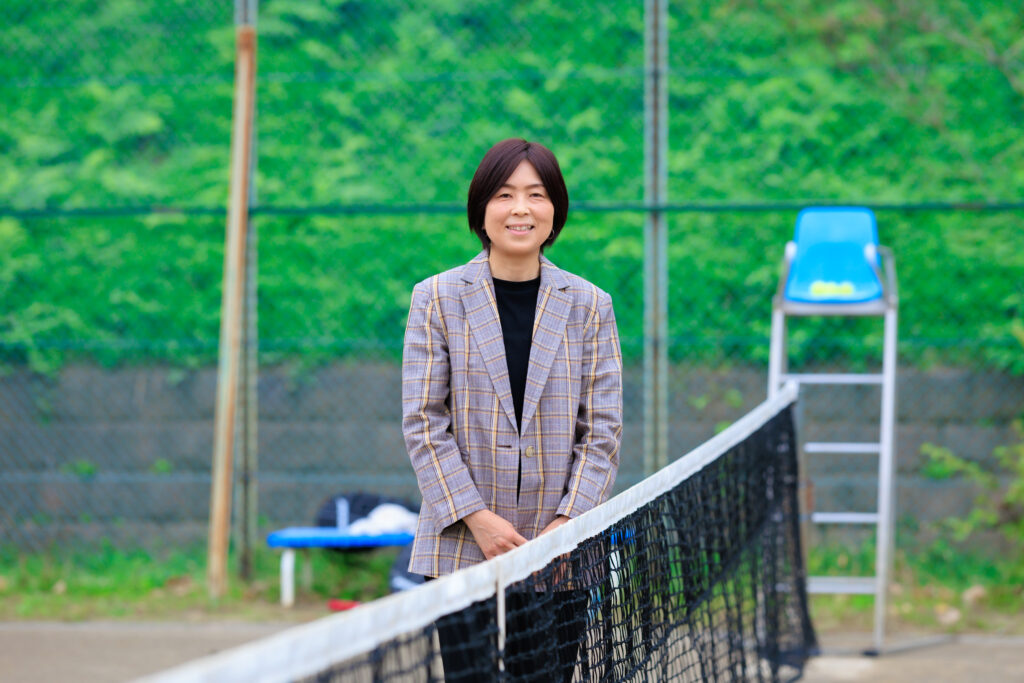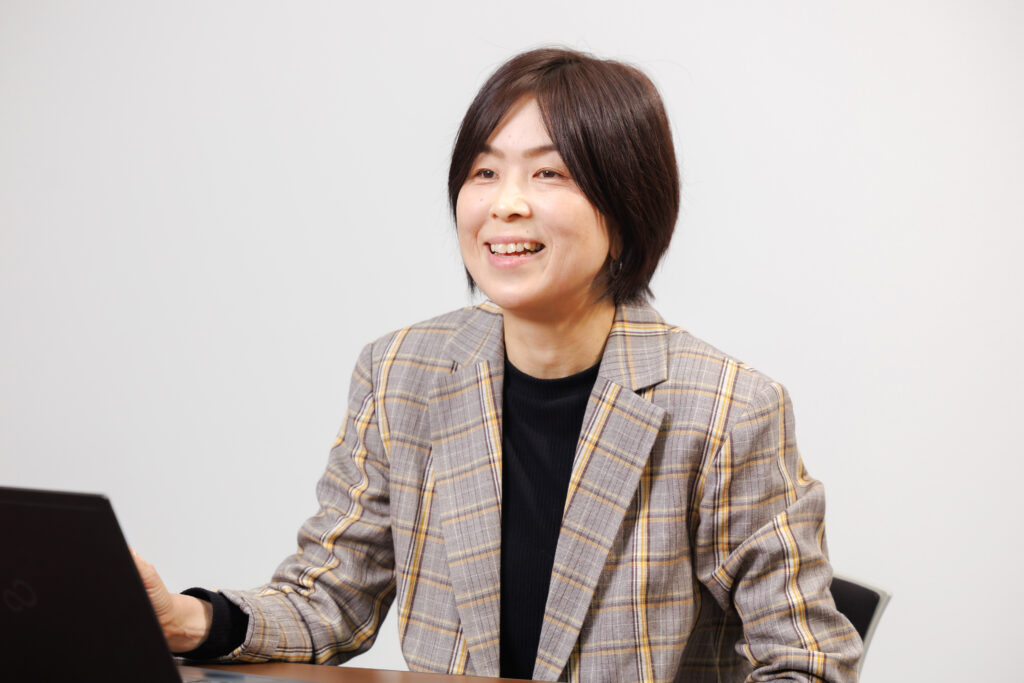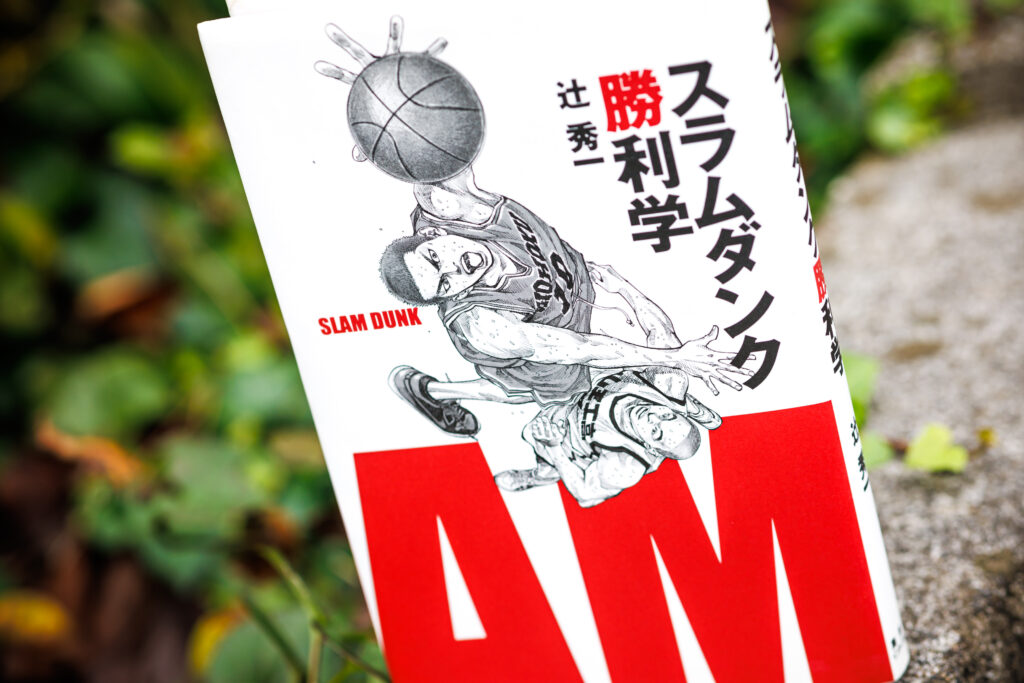
Associate Professor Ryoko Takemura of the Embodied Wisdom Division at the Center for Liberal Education and Learning is a former professional tennis player. She surveys athletes, who, like herself, have experienced being active as a top-level tennis player, and then based on this, she compares and analyzes the expertise processes of such athletes.
The study subject that I am currently working on is research focused on how various factors are involved in a person’s becoming a top athlete (the process of gaining expertise). Is it only possible for people who are born with outstanding talent to become a top athlete? Can people reach this level as the result of practice and their environment, rather than simply their talent? This is the area that I would especially like to learn about.
I started tennis at an early age, and, after graduating from university, I participated in numerous competitions both in Japan and overseas as a professional player. Because I have experienced being up close with athletes who are considered to be top-level players, I am deeply interested in the process through which these athletes reach such a level.
Currently, I am targeting former and active professional tennis players who have had experiences such as holding the national title, or top prize in an international competition, and am investigating the factors behind their becoming a top-level player, starting from their early childhood (such as practice environment, practice time, family type, coach type, and personality traits). Although I am still only partway through this research, a number of deeply interesting trends have started to become apparent.
Trends regarding family members of top athletes

My research has revealed certain trends in how the individual interacts with their family during elementary and junior high school. Focusing on several individuals who maintained particularly high results in tennis as professional player, a trend has become apparent in which, during elementary and junior high school, these individuals never experienced being talked to extensively by their parents about the results of their matches.
A common trait among these individuals was that, although their parents were strict in regards to attending practice and matches and following through with what they had agreed or promised, they never mentioned anything specifically about the results or comments on winning or losing.
While it appears that many parents of junior athletes are very passionate, if parents only focus on whether their child wins or loses, the child ends up feeling an enormous amount of pressure. This means that during elementary and junior high school in particular, although learning about competition and games from matches is one important element, perhaps the elements that bring out the abilities of the child in the future are enjoying playing, acquiring an interest in improving, and having experiences that help to boost motivation.
It seems that if a family and coach take an approach with such elements in mind, the child’s potential will be greatly increased. In light of my own experience with teaching tennis after my retirement to children at the junior through student-athlete levels, this hypothesis makes perfect sense to me.
Seeking to help people become aware of their own potential through research results
My area of specialty is sports psychology, which is a field of study in which one investigates the impact that the mental state of athletes has on their performance. Conducting surveys from various perspectives is very rewarding, and it is my hope to connect my research with actual places of instruction, and also to deploy it in other fields.
Actually, I am sometimes consulted by the family of junior athletes who ask me, “What should we now do (or choose) in order to achieve better results?” If I can show them the trends regarding various athletes based on my research data, I can give them more specific advice, and have a positive impact on their decision-making at important junctures.
In my surveys thus far, I have acquired data targeting top athletes based on retrospective record, and I have additionally started longitudinal studies targeting active athletes in their teens and 20s.
My goal regarding this research is to compile my study content into a book, and help people become aware of their own potential, not only in sports but also in general.
The book I recommend
“Suramu Danku Shorigaku”(Slam Dunk: The Science of Winning)
by Shuichi Tsuji, Shueisha International

The author Dr. Tsuji is a sports doctor, and the leading authority on mental training for athletes. During my university days, there were times when Dr. Tsuji provided me with support on mental training, and I was able to learn about topics such as “goal setting,” which are covered in this book. Thanks to this, I was able to achieve actual results, and this greatly changed my tennis life.
-
Ryoko Takemura
- Associate Professor
Embodied Wisdom Division
Center for Liberal Education and Learning
- Associate Professor
-
Graduated from Faculty of Environment and Information Studies, Keio University, and completed doctoral program at Graduate School of Media and Governance, Keio University. Holds Ph.D. in policy and media. Worked as a professional tennis player, part-time lecturer at Keio University and Tokai University, and lecturer at Department of Health and Physical Education, Faculty of Humanities, Sophia University, before taking up current position in April 2022.
- Embodied Wisdom Division
Interviewed: October 2022